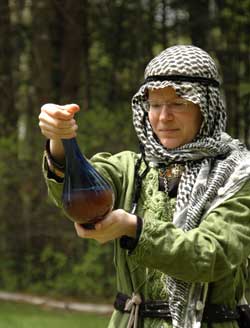The Between-Game Economy

Coins
The standard coin is the mark (M). New characters start with three marks (unless they have Wealth or Poverty). A character can never start a game below their initial money total. That is, if you lose all your money at a game, you will start the next game with three marks once again.
There is also a larger coin, called the crown (C), worth five marks. Smaller than the mark is the fivepence (F), sometimes called the "bit"; there are five fivepence to one mark. The smallest coins are the small pence (P); there are five pence to a fivepence, as the name implies.
25 pence = 5 fivepence = 1 mark = 1/5 crown
Finally, there is also a large gold coin, the ducat (D), worth two crowns or ten marks.
Purchasing Magical Services
Characters may require healing magic or other services between events. If the effects of a problem naturally dissipate within a specific time period, you need not worry about finding appropriate services. However, continuing problems (such as lost limbs or Curse, Forget, or Suggestion spells) will require hiring a mage or cleric to remove them (see "Healing Debt," below).
Purchasing these services may only be done at the beginning of the next event attended. The cost is twice the level of the spell, in marks. These costs are for all characters, regardless of the fact that they may be able to perform these services themselves in-game.
Spells
- Determine Potion
- Identify
- Regeneration
- Dispel Magic
Healing Debt
Characters who finish an event with unhealed limb wounds (or a chest wound, if the bleeding is stopped in-game) will be able to find healing for these wounds for free. However, characters with lost limbs, curses, or other ailments will need to seek cures.
A character may go into "Healing Debt" between events, not during them. You can only take Healing Debt to purcahse healing (including cures and removing curses) and not for identifying items or determining potions! If your character does not have enough money to pay for a healing spell, you can borrow the needed amount from a church or charity, but only enough money to pay for one healing only. Your character must then pay off the entire amount before being permitted to go into healing debt again. Paying off the debt will require twice the amount borrowed.
A character in debt must put all money earned towards the debt, minus their starting money total (three marks, or one mark if you have Poverty.) This may be done at the end of events, so that characters with Charity can pay off the debt quicker, but characters with Poverty will need a long time indeed to pay off debts. If your character can find another character to pay for the healing, you may get a lower interest rate (plus some good opportunities for role-playing and making contacts with other players)!
Example: Samuel has 7 marks, and needs a Regenerate (a fifth-level spell) for healing, which costs 10 marks. He can then borrow 6 marks (he has 7 but must keep 3, so he has 4 available and needs 6 more), which gives him enough money to buy the spell. He then has a debt of 12 marks (double the amount borrowed).
Converting Experience into Money
At every game, you may convert up to 2 unspent XP into marks, yielding five marks per 0.5 XP you spend.
Commerce and Services
Poison
Poison costs 10 marks per dose. Poison antidote is purchased as if it were a Cure Poison potion.
Holy Weapons
You may buy a permanently Holy weapon from the upper clergy of your patron deity for 50 marks. The enchantment will only work for you. This purchase must be approved by the Game World Committee. (If you have no patron deity, you may not purchase a Holy weapon!)

Potions
Potions may be bought or sold at check-in only.
Selling
You may sell any enduring potion you own. Most potions sell for a number of marks equal to three times the level of the equivalent spell. If a potion has only two events left before it goes bad, the out-of-game merchant will only buy it back for two marks per level. If the potion has only one event left, the out-of-game merchant pays one mark per level.
Buying
You may purchase one enduring (but not extra-enduring) potion at check-in before each event. The cost of the potion is five times the level of the equivalent spell, in marks. The difficulty number and Will of the potion are the minimum level of Alchemy needed to create it.
Potion “Shelf Life”
Characters can carry enduring potions from one event to the next, but potions are inherently unstable and, if carried around, will eventually become inert. Once an enduring potion has been brought to a total of 5 games (or 10 games for an extra-enduring potion), it becomes useless. At check-in, you may decide whether or not to bring a potion into game—if you do not, you will not have it during that game, but its lifespan will not decrease.
If a potion is sold or stolen in-game, then it is the original owner's responsibility (out-of-game) to tell whomever gets the potion how long it will last.
